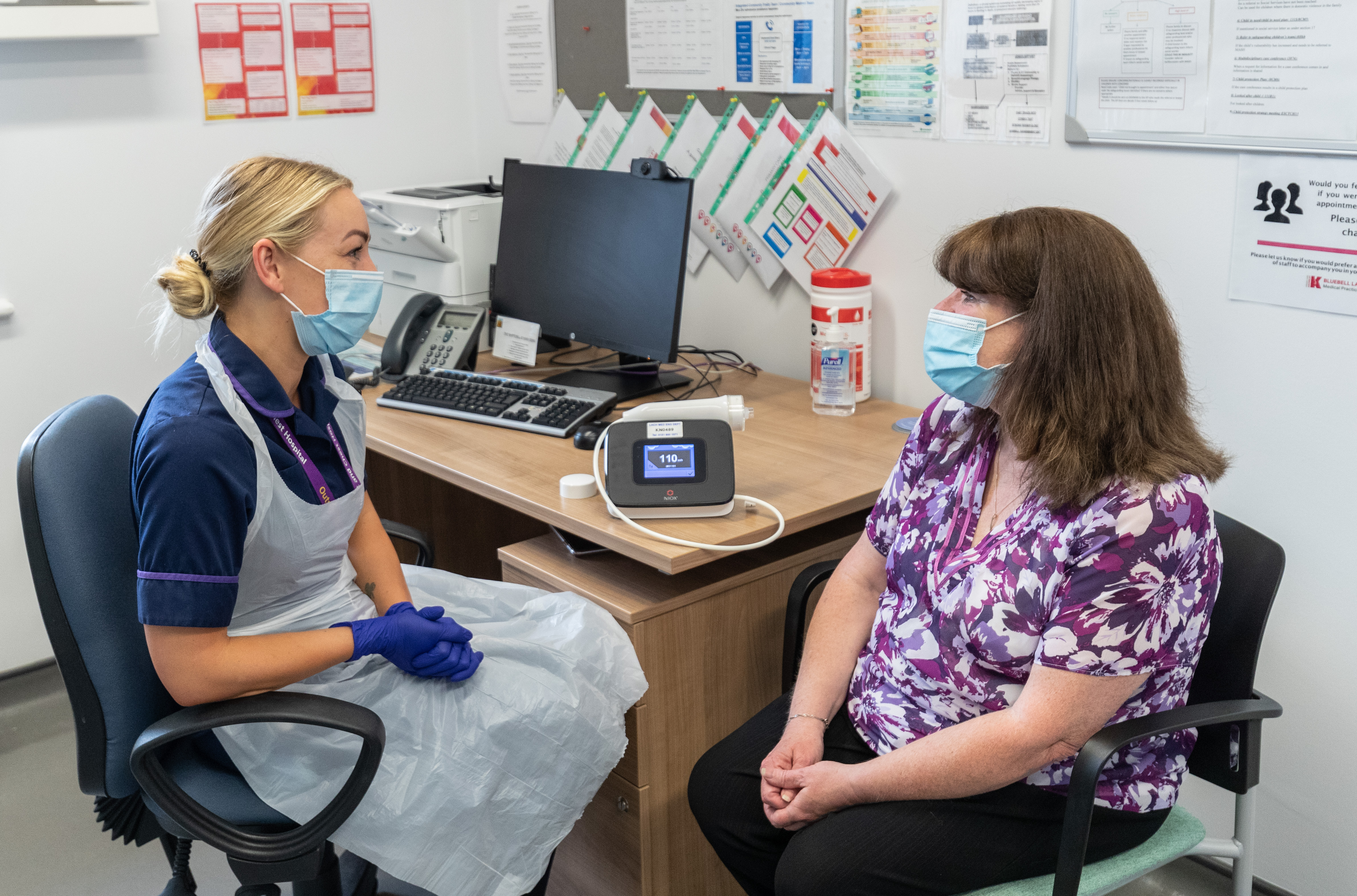
Transforming asthma pathways
Transforming asthma care through improved access to diagnostics and innovative treatments
Asthma is a common health condition, affecting more than 5.4 million people in the UK. Uncontrolled, severe asthma has a huge impact on the lives of 200,000 UK patients, including frequent emergency hospital admissions and serious side-effects from extended periods on steroid medication.
As a key partner of NHS England’s Accelerated Access Collaborative (AAC), the AHSN Network of 15 AHSNs including Health Innovation North West Coast, have supported the rollout of two asthma care innovations to improve the asthma pathway in England as part of the AAC Rapid Uptake Products (RUP) programme.
Fractional exhaled Nitric Oxide (FeNO) testing
FeNO testing is a simple, non-invasive test to measure the amount of nitric oxide in an exhaled breath – a biomarker for airway inflammation. FeNO testing can improve patient care by contributing to a faster and more effective asthma diagnosis when used alongside a detailed clinical history and other tests. It can also be used to monitor patient response to asthma treatments.
Biologic therapies for patients with severe asthma
Asthma biologics work in a targeted way, by disrupting pathways causing airways inflammation, helping to manage symptoms and reduce exacerbations. These therapies can transform patients’ lives by reducing long-term side effects of other treatments, such as steroids, and reduce the number of life-threatening asthma attacks.
In 2020, it was noted that both innovations had lower-than-expected patient access, presenting an opportunity to improve uptake and support the NHS Long Term Plan ambition of improving early and accurate diagnosis of respiratory conditions by embedding FeNO testing in primary care and increasing access to asthma biologics through improved clinical pathways.
Led by Oxford AHSN (Asthma Biologics) and Wessex AHSN (FeNO), the programmes focused on collaboration at a national, regional and local level across healthcare systems, industry partners, patients, and the community and voluntary sector to integrate FeNO testing and access to asthma biologics into everyday clinical practice.
AHSNs worked within their individual systems to support asthma pathway improvements by taking a pathway-based transformation approach. AHSNs provided clinical and transformation leadership, shared best practice and developed education and implementation materials for those involved in providing asthma care.
A package of educational resources for each innovation, including information documents, podcasts, posters, learning modules and webinars, was created to support clinicians. The toolkits were designed in a practical way to support teams adopting and sustaining the use of FeNO and asthma biologics.
Outcomes
The programmes aimed to improve patient care and outcomes through enhanced access to diagnostics and treatments for severe asthma. The full impact of the programmes is still being finalised however interim data shows that between April 2021 and February 2023:
- An estimated 190,818 additional patients benefited from diagnostic FeNO testing across England.
- More than 4,403 new patients began receiving life-changing biologic therapies.
- 3,157 fewer patients are now receiving high-dose (3g or more) oral steroids each month.
- 41 Pathway Transformation Fund projects were completed to support wider adoption of asthma biologics and FeNO
For the clinical workforce delivering asthma care the programme has supported learning, training and development:
- More than 4,300 hours of specialist training was delivered to upskill those providing asthma care.
- 1,750 people attended webinars and learning collaboratives related to asthma biologics and FeNO.
- Online resource toolkits for asthma biologics and FeNO have been accessed more than 28,000 times.
- The asthma consensus pathway was launched, providing a new set of standards based on best practice to guide how to deliver optimal care across the entire patient journey.
Next steps
The national FeNO and Asthma Biologics programmes have now completed and have made substantial contributions to the transformation of asthma care in England while significantly increasing the access to and adoption of FeNO and asthma biologics. Learning from the AHSN programmes is being fed into the development of NICE/SIGN/British Thoracic Society asthma guidance, expected in 2024, offering real world insights to implementation considerations.
There are opportunities to continue this work and improve asthma care by enhancing rollout of the innovations and ensure more patients can benefit. Both toolkits, training modules and other resources created during the programmes will remain accessible to NHS clinicians following the end of the AHSN programmes.
Health Innovation North West Coast and AHSN Network are now transitioning to support healthcare inequalities as a national priority as part of NHS England’s Innovation for Healthcare Inequalities Programme (InHIP). Building on the transforming asthma pathways work, a number of AHSNs will support the respiratory aspect of the NHS England Core20PLUS5 approach, continuing to use the implementation and educational resources developed for the FeNO and Asthma Biologics national programmes.
Links and resources
Proactive management @Home
COVID-19 has placed unprecedented pressure on our health system. Immediate focus has understandably been on supporting patients with or at risk of the virus. However, there are a large number of people living with long-term conditions (LTCs) who need continuing, proactive management to prevent a wave of exacerbations, increasing healthcare demand in the months ahead. Find out more about proactive care @Home.

